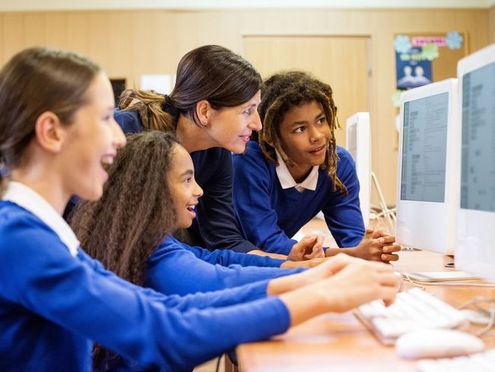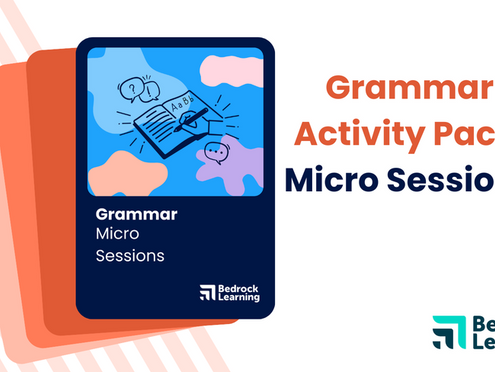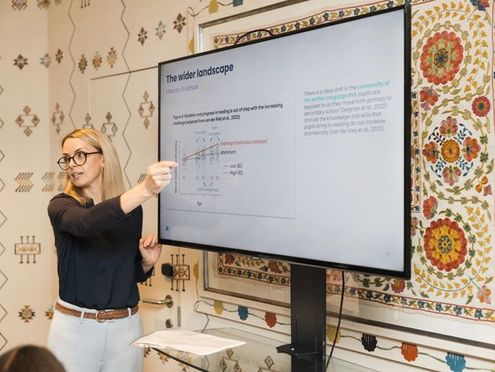From political speeches, to Op-Eds, to poetry, all writers have an agenda and, through social media and the internet, learners are now scrutinising a huge number of texts on a daily basis, both inside and outside of the classroom. This is why helping learners to develop their critical literacy is more important than ever before.
Critical literacy at GCSEs and beyond
The specifications for GCSE English Language and English Literature emphasise that learners should be able to read critically, in order to develop a nuanced understanding of texts in their entirety. So far, so vague.
We know how important critical literacy is, but it is too often left to the individual teacher without a sense of policy or purpose. With all of the pressure of getting learners through their GCSEs, it is easy for critical literacy to fall by the wayside, or for students not to realise that all of those analytical skills which they learned for An Inspector Calls can also be applied to the latest viral TikTok video.
This is also about so much more than GCSEs. In this era of misinformation, 98% of children do not have the critical literacy skills to say whether a news story is real or fake, and almost half of students are worried about not being able to spot fake news. Aggressive targeted advertising means that everyone who is online is exposed to algorithms trying to push purchasing at all costs. As teachers, we have a responsibility to arm our students with the tools to navigate this landscape – and this can be difficult given that many adults struggle with the concept of critical literacy.
How can we improve students' critical literacy skills?
So, how can we enable our learners to develop the skills required to be critically literate? A report from the Commission on Fake News and the Teaching of Critical Literacy stresses that this burden should not fall on individual teachers but should be combatted schoolwide, with clear objectives and guidance written into a policy.
Teachers across departments should be given training and encouraged to develop a cross-curricular approach. Furthermore, digital giants like Facebook and Google have a role to play in stopping the spread of misinformation to the best of their ability.
In the English classroom, critical literacy can begin with word-level analysis which, of course, means that, before they can be critically literate, learners need to be confident and fluent readers, something which requires comprehension of 95% of the words in the text. We can’t expect learners to find nuance without first having an explicit understanding of the meaning of the text - and this requires explicit teaching of vocabulary.
With this under their belt, the fun begins. We guide learners to consider an author’s intent and the impact of individual words. Developing this ability to analyse with precise focus is truly a skill for life.
Experts are clear that critical literacy goes beyond bias and spotting stereotypes into “asking powerful questions about a text’s provenance, accuracy, authority, and purpose”. Asking questions about texts is at the centre of all English teaching, but perhaps we need to go further in the questions that we ask: What does this text want from me as a reader? Why is this text considered to be of value? What biases am I bringing to my understanding of this text?
The Four Resources Model, developed by Luke and Freebody, uses a four-stage framework for developing these questions, as we position ourselves and our students as text decoders, text participants, text users and text analysts. (Dr Navan Govender also shares an excellent example of this in practice.)
However, in asking these questions, we also need to be mindful about the answers we are expecting. Or rather, we shouldn’t be expecting answers at all. We need to do away with the idea that teachers have all of the answers when it comes to analysing a text and that students should be striving for a ‘right answer’. Critical literacy is a process of exploration which we should embark on with our students. We never know what they might teach us!
Understanding the political nature of critical literacy is an important part of the drive to upskill our learners. In teaching them to cut through the jargon and get to the heart of a text’s message, we are empowering them to both recognise alternative perspectives and to insist on the value of truth.
They might just enjoy reading more as a result.




